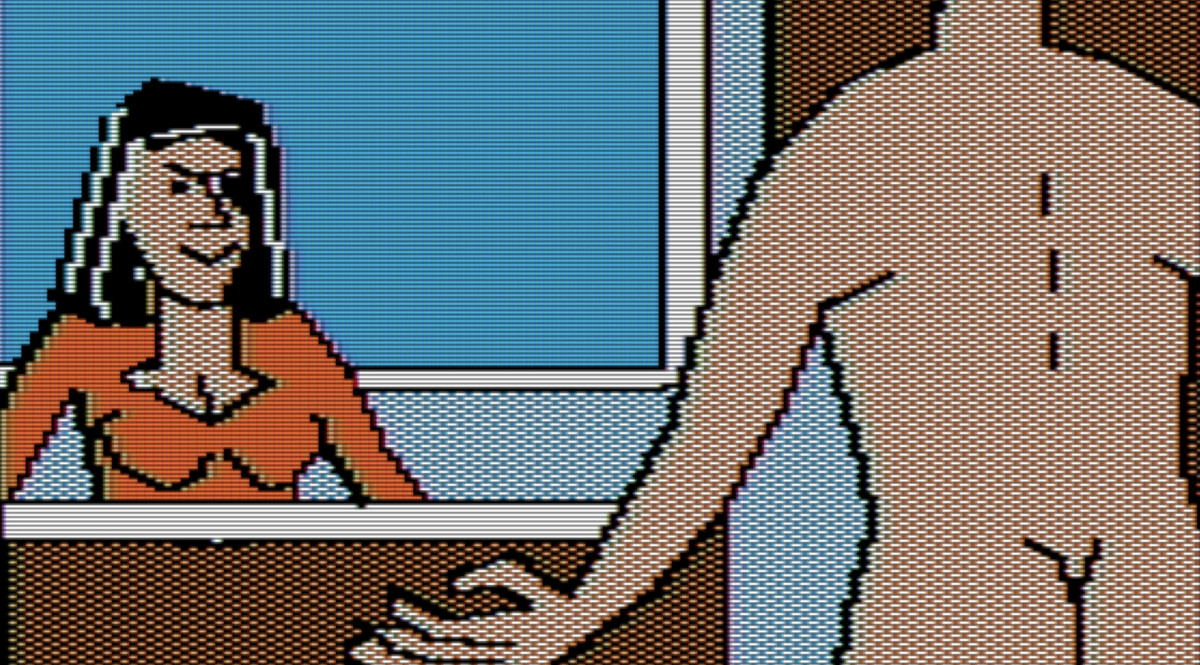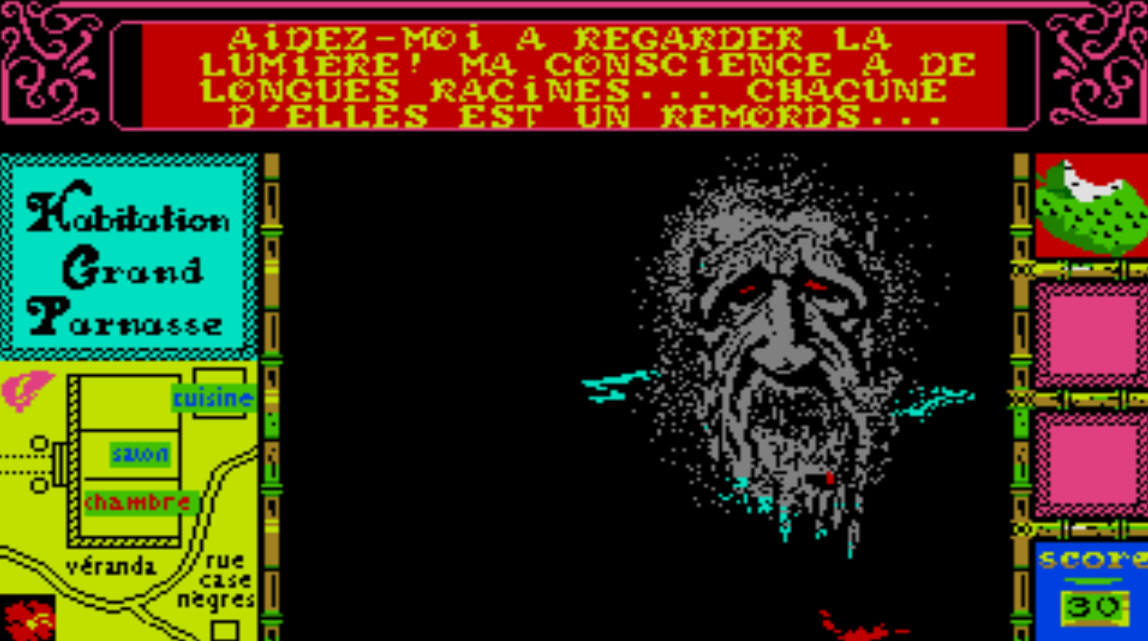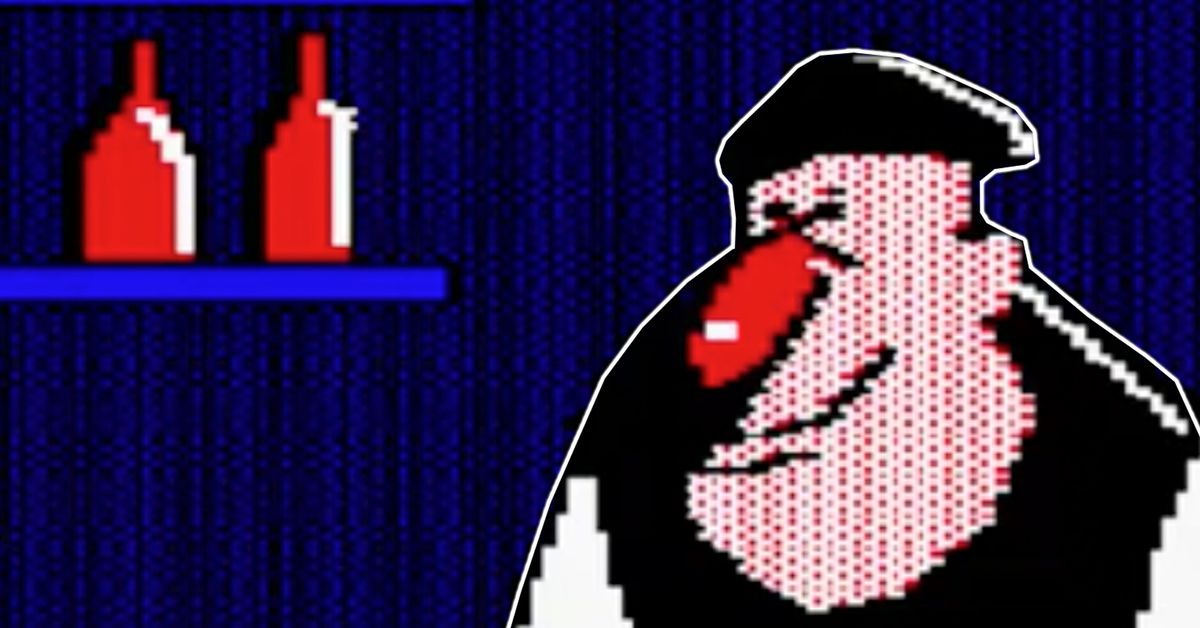France plays an outsized role in the global game industry. It’s the second-largest producer of video games in the world, and the road there is paved with weird little adventure games. Before the industry went global, before AAA games really even existed, French developers were making offbeat, sexy, political games that reflected their own reality.
These include games like La Femme Qui Ne Supportait Pas Les Ordinateurs, from Chine Lanzmann. La Femma is a text-based game whose interface is made to resemble the early French network Calvados.
In it you play a woman in an online chat room encountering various characters who all want to have sex with you, one of them being your own sentient computer. The writing is excellent. It feels nasty and uncomfortable to play, but it’s also quite funny. The characters’ thirsty, over-the-top reactions constantly made me chuckle. Early on, if you tell the computer that you’re blonde, it reacts with the textual equivalent of Pepé le Pew seeing that dang cat.
La Femme is a branching narrative that leads to six endings, all of which suck. The game was based on Lanzmann’s own experience moderating discussions on Calvados’ message boards. And if you’re thinking, “Wow, wild that one of the earliest French video games is about being a woman getting harassed online, that sounds weirdly topical,” well — this was not at all out of place for French games in the ’80s and early ’90s!
Sure, you had your racing games, faux-Donkey Kongs, and your Chess sims. But there were also a surprising amount of developers who were using games to explore their issues with the world around them.
Some of the main culprits here were Froggy Software, a company started by Jean-Louis Le Breton and Fabrice Gille. Along with La Femme, they published a game called Baratin Blues, which satirized right-wing Parisian mayor Jacques Chirac’s attempts to privatize the Parisian water system. On the other end of the political spectrum, they published Le mur de Berlin va sauter — the Berlin Wall is gonna BLOW — a game where you’re trying to stop a gay leftist terrorist from yeah, blowing up the Berlin Wall, which sounds like it could be the plot of the next Far Cry game.
Le Breton and Gille were both “soixante-huitards” — participants in the May ’68 protests that almost tore the country apart. May ’68 was about protesting capitalism, consumerism, and American imperialism. According to video game scholar Filip Jankowski, Le Breton and Gille brought that rebellious energy to Froggy Software, developing and publishing games that gave the middle finger to the status quo.

Arcade and action games had always taken center stage in the United States, but France built a reputation for making … “weird games.” Or at least, they were weird to the non-French in the same way that those sexy Orangina ads are. Instead of fantastical action-focused titles, developers were exploring France’s difficult history, and its depressing present.
The most groundbreaking of these games might have come from Muriel Tramis. Tramis was a programmer working on military drones for Aerospatiale, but in 1986 she decided to give it up and make games. Tramis landed at Coktel Vision, where she was given free rein. She made educational games, like La bosse des maths. She made a classic puzzle-adventure series called Gobliins. She made erotica, like Emmanuelle and Fascination, and in the ’90s she experimented with FMVs like Urban Runner.
But the two games she’s perhaps best known for are Méwilo and Freedom. Méwilo is an adventure game set in Tramis’ homeland of Martinique, and co-written with Creolité author Patrick Chamoiseau. The game stars a paranormal psychologist in 1902, investigating a city literally haunted by France’s imperialism. But that’s just a pretext for experiencing the “economic, political and religious life,” in St. Pierre. The game earned Tramis a Silver Medal from the Ministry of Culture in 1988.

Her follow-up project was Freedom: Rebels in the Darkness, a strategy game in which you play an enslaved person in Martinique organizing a rebellion against slave owners. It’s bloody and violent, but also complex: A lot of the strategy is simply trying to convince people to join you, despite the risks to their lives and their families.
This counter-cultural moment of France’s game industry still couldn’t survive the industry’s growth and the black hole of capitalism. As the industry matured into the ’90s, consoles and action games pushed PCs and adventure games to the fringe.
Coktel Vision, where Muriel Tramis did so much of her work, merged with Vivendi in 2003, and Tramis found that she just didn’t like the new company culture — she had less creative freedom. Nowadays she manages her own company, Avantilles, where she makes 3D software.
That little story is pretty indicative of the way games publishing as a whole has gone. Companies become larger, make games for a broader audience — and when you appeal to a broad audience, everything is diluted. In the case of French developers (and all developers, let’s be real), “broad” eventually came to mean an anglophone player base. A lot of games that come out of European developers will have a large English-speaking, and more importantly, majority American audience. Games are being made to cater to us.
Massive publishers like Ubisoft may dominate the industry these days, but there are still French indie developers making their own offbeat, sexy, political games that reflect their own reality, just like the auteurs of the ’80s once did. Games like Haven and Dordogne now carry the torch.
Check out the video to see more funky old French games from the ’80s, and make sure you subscribe to Polygon’s YouTube channel for this and more videos.
Polygon – All
Source link
Related Post:
- Under fire Activision Blizzard exec Frances Townsend steps down from company’s women’s network • Eurogamer.net
- Games Within Games – The Best Video Games In Other Video Games
- Aerial_Knight’s Never Yield: How Developer Neil Jones Made His Way Into the Games Industry
- All the best video games being made right now
- Former PlayStation CEO Thinks Video Game Industry is Unsustainable
- Watch How a Nendoroid Figure Is Made at Good Smile Company in New Video
- Alligator Loki Gets Hilarious Subtitles in This Fan-Made Video
- Video: Check Out This Fan-Made Remaster Trailer For Banjo-Kazooie
- Random: This Absolute Unit Of A Game Boy Advance Was Made By The Creator Of ‘Long Game Boy’
- This Civ 6 modder has made games last much, much longer
